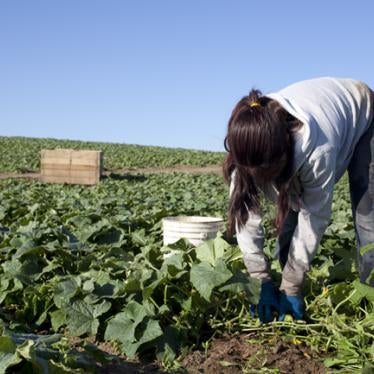Last September, as I left a middle school in central Kentucky, I noticed a sign in the parking lot: “This School is a Tobacco-Free Zone.” I had just finished interviewing a 6th grader, “Jose,” who spends his weekends and summer vacations working long hours on tobacco farms.
Jose was protected from tobacco at school. It’s illegal for him to walk into a store and buy a pack of cigarettes until he’s 18. But he can legally work on any tobacco farm, absorbing nicotine through his skin, at age 12. When it comes to protecting children from the dangers of tobacco farming, the US government and tobacco companies are not doing enough.
Thousands of children work on tobacco farms in the US each year. They are literally surrounded by tobacco, often for 50 or 60 hours a week in the height of the growing season.
In our recent report on hazardous child labor in US tobacco farming, Human Rights Watch found that almost three-quarters of the children interviewed said they got sick while working with tobacco. “I got headaches and I felt like throwing up,” Jose said. The symptoms he – and many other children – described are consistent with acute nicotine poisoning.
I was raised in the era of hard-hitting anti-smoking ads. The image of a man strumming a guitar and singing through a voice box kept me from lighting up as a teen. And as a graduate student in public health, I learned in devastating detail about the health consequences of smoking.
But I never heard about how tobacco farming affects workers.
Today, on World No Tobacco Day, you’ll hear about the hazards of smoking, and the astonishing toll of tobacco use worldwide. What you might not hear about are the children being poisoned by nicotine while working on US tobacco farms.
The largest tobacco companies in the world, selling well-known cigarette brands like Camel and Marlboro, buy tobacco grown in the US. These companies can’t market their products to children, but they can manufacture products containing tobacco that was cultivated by children.
If we want to make sure our children grow up free of tobacco, we need to make tobacco farms child-free zones. Tobacco companies should adopt clear policies prohibiting children under 18 from doing hazardous work on farms in their supply chains. And Congress and the Obama administration should enact laws and policies to keep children out of dangerous work on tobacco farms.









